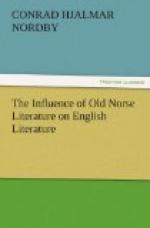Turning to flowery sward the rock-strewn way,
Weakness to strength, or darkness into day.
Therefore, no marvels hath my tale to tell,
But deals with such things as men know too well;
All that I have herein your hearts to move,
Is but the seed and fruit of bitter love.
It is aside from our purpose to tell this story here. The more we study this marvelous work, the more it is impressed upon us that in the reign of love all men and all literatures are one. To the Englishman this description of an Iceland maiden is no stranger than it was to the men who sat about the spluttering fire in the Icelander’s hall. It is the form of Gudrun that is here described:
That spring was she just come
to her full height,
Low-bosomed yet she was, and
slim and light,
Yet scarce might she grow
fairer from that day;
Gold were the locks wherewith
the wind did play,
Finer than silk, waved softly
like the sea
After a three days’
calm, and to her knee
Wellnigh they reached; fair
were the white hands laid
Upon the door posts where
the dragons played;
Her brow was smooth now, and
a smile began
To cross her delicate mouth,
the snare of man.
(Earthly Paradise, Vol. II, p. 247.)
Not less accustomed are we to such heroes as Kiartan:
And now in every mouth was
Kiartan’s name,
And daily now must Gudrun’s
dull ears bear
Tales of the prowess of his
youth to hear,
While in his cairn forgotten
lay her love.
For this man, said they, all
men’s hearts did move,
Nor yet might envy cling to
such an one,
So far beyond all dwellers
’neath the sun;
Great was he, yet so fair
of face and limb
That all folk wondered much,
beholding him,
How such a man could be; no
fear he knew,
And all in manly deeds he
could outdo;
Fleet-foot, a swimmer strong,
an archer good,
Keen-eyed to know the dark
waves’ changing mood;
Sure on the crag, and with
the sword so skilled,
That when he played therewith
the air seemed filled
With light of gleaming blades;
therewith was he
Of noble speech, though says
not certainly
My tale, that aught of his
he left behind
With rhyme and measure deftly
intertwined.
(P. 266.)
The Old Norse touch here is in the last three lines which intimate that the warrior was often a bard; but be it remembered that the Elizabethan warrior could turn a sonnet, too.




